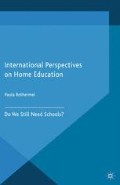Abstract
Home educating one’s children will obviously have a major effect on the lives of parents. Parents have to make the initial decision to home educate, to take on the huge responsibility for their children’s education, to deal with authorities and to reorganize the family’s lives to incorporate new schedules, as well as reflect on whether it is the right decision. Further, they need to continually analyse and re-analyse what they are doing as a family and adjust as they go along, taking into account not only their children’s development and shifts in interests, but also their own needs and the needs of other family members.
Access this chapter
Tax calculation will be finalised at checkout
Purchases are for personal use only
Preview
Unable to display preview. Download preview PDF.
References
Apple, M. W. (1984) ‘teaching and “women’s work”: a comparative historical and ideological analysis’, in E. B. Gumbert (Ed.), Expressions of Power in Education: Studies of Class, Gender and Race. Atalanta, GA: Georgia State University.
BBC Magazine (2003) ‘Your ideas for kids’ summer fun’, News Magazine, http://news.bbc.co.uk/1/hi/magazine/3091419.stm, accessed 2 February 2009.
Camporese, R., Freguja, C. and Sabbadini, L. L. (1998) ‘Time use by gender and quality of life’, Social Indicators Research, 44, 119–144.
Charles, N. and Kerr, M. (1999) ‘Women’s work’, in G. Allan (Ed.), The Sociology of the Family. Oxford, UK: Blackwell.
Fox, L., Han, W. J., Ruhm, C. and Waldfogel, J. (2013) ‘Time for children: trends in the employment patterns of parents, 1967–2009’, Demography, 50(1), 25–49.
Flouri, E. (2005) Fathering and Child Outcomes. West Sussex, UK: John Wiley & Sons, Inc.
Held, V. (1983) ‘The obligations of mothers and fathers’, in J. Treblicot (Ed.), Mothering: Essays in Feminist Theory. New York: Rowman & Littlefield, Inc.
Hoffman, L. (1974) ‘The effects of maternal employment on the child: a review of the research’, Developmental Psychology, 10, 204–248.
Isenberg, E. (2002) ‘Home schooling: school choice and women’s time use’, Occasional Paper No 64, National Center for the Study of Privatization in Education, Teachers College, Columbia University, New York.
Lees, H. E. (2013) Education Without Schools: Discovering Alternatives. Bristol, UK: The Policy Press.
Lewis, S. (1991) ‘Motherhood and employment: the impact of social and organizational values’, in A. Phoenix, A. Woolett and E. Lloyd (Eds), Motherhood; Meanings, Practice and Ideologies. London: Sage.
Lois, J. (2006) ‘Role strain, emotion management, and burnout: homeschooling mothers’ adjustment to the teaching role’, Symbolic Interaction, 29(4), 507–530.
Mattingly, M. J. and Bianchi, S. M. (2003) ‘Gender differences in the quantity and quality of free time: the U.S. experience’, Social Forces, March, 81(3), 999–1030.
Richardson, D. (1993) Women, Motherhood and Childrearing. Hampshire, London: Macmillan.
Safran, L. (2008) Exploring Identity Change and Communities of Practice among Long Term Home Educating Parents. PhD Open University, unpublished.
Schrecker, T. (1997) ‘Money matters: a reality check, with help from Virginia Woolf’, Social Indicators Research, 40(99), 99–123.
Sharpe, S. (1984) Double Identity, The Lives of Working Women. London: Penguin Books.
Sirianni, C. and Negrey, C. (2000) ‘Working time as gendered time’, Feminist Economics, 6(1), 59–76.
Tizard, B. (1991) ‘Employed mothers and the care of young children’, in A. Phoenix, A. Woolett and E. Lloyd (Eds), Motherhood; Meanings, Practice and Ideologies. London: Sage.
Warren, T. (2004) ‘Working part-time: achieving a successful “work-life” balance?’ The British Journal of Sociology, 55(1), 101–122.
Welsh, E. Buchanan, A., Flouri, E. and Lewis, J. (2004) Involved Fathering and ChildWell-being: Fathers’ Involvement with their Secondary School Age Children. London: National Children’s Bureau.
Yarrow, M. (1962) ‘Childrearing in families working and non-working mothers’, Sociometry, 25, 122–140.
Editor information
Copyright information
© 2015 Leslie Safran Barson
About this chapter
Cite this chapter
Barson, L.S. (2015). Home Educating Parents: Martyrs or Pathmakers?. In: Rothermel, P. (eds) International Perspectives on Home Education. Palgrave Macmillan, London. https://doi.org/10.1057/9781137446855_2
Download citation
DOI: https://doi.org/10.1057/9781137446855_2
Publisher Name: Palgrave Macmillan, London
Print ISBN: 978-1-349-49611-2
Online ISBN: 978-1-137-44685-5
eBook Packages: Palgrave Education CollectionEducation (R0)

